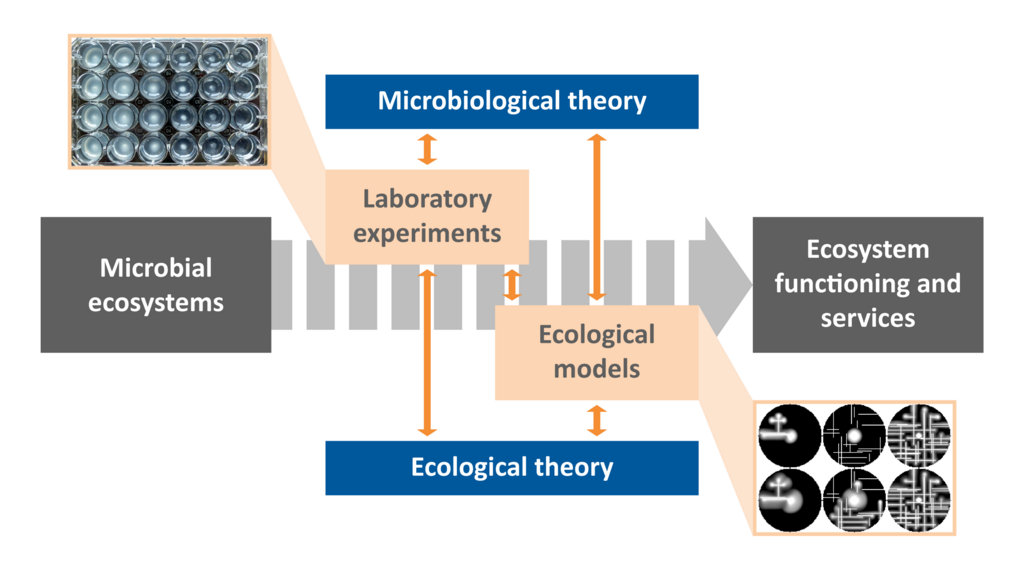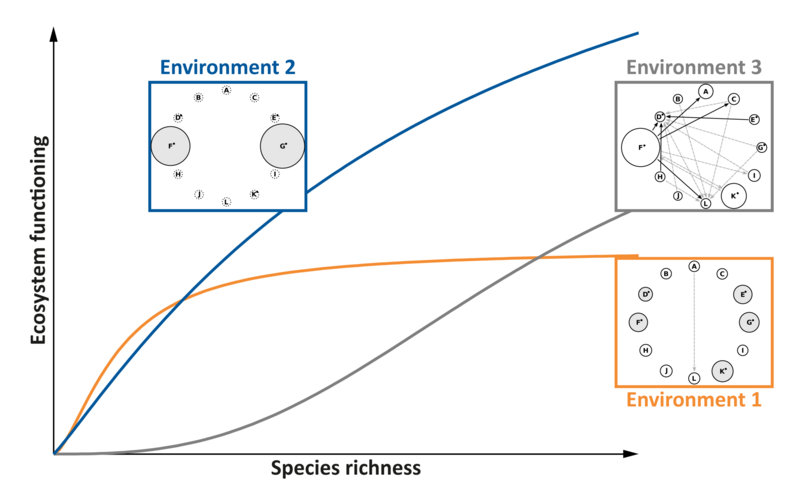Microbial Ecosystem Analysis
Microorganisms play key roles in many ecosystems and contribute to crucial processes such as nutrient cycling, chemicals’ degradation, biofuel production, or greenhouse gas emission and consumption.
Therefore, we use ecological models to analyse the structure, dynamics and stability of microbial ecosystems, their functioning and the provision of ecosystem services. Microcosms are also efficient tools for testing ecological theories and model predictions under well-controlled conditions at small spatial and temporal scales, to the benefit for both ecology and microbiology.

Integration of theory, modelling and experiments enables us to study population and community dynamics under different environmental conditions and to assess resulting ecosystem functioning. This is done in close cooperation with the Department of Applied Microbial Ecology.
In our spatially implicit or explicit modelling approaches, we combine concepts of microbial kinetics, organismic ecology (dispersal, consumer-resource dynamics, energy budgets), abiotic drivers (spatial heterogeneities, disturbances, environmental change and stress) and biodiversity research (species coexistence and interactions). In particular, we focus on the interplay of abiotic and biotic processes, the relation between structural and functional characteristics of ecosystems including their functional resilience, and appropriate management interventions to stabilize and enhance ecosystem functioning and services.

Selected Publications
- Bogdanowski, A., Banitz, T., Muhsal, L.K., Kost, C., Frank, K. (2022):
McComedy: A user-friendly tool for next-generation individual-based modeling of microbial consumer-resource systems
PLoS Comput. Biol. 18 (1), e1009777 10.1371/journal.pcbi.1009777 - Banitz, T., Chatzinotas, A., Worrich, A. (2020):
Prospects for integrating disturbances, biodiversity and ecosystem functioning using microbial systems
Front. Ecol. Evol. 8 , art. 21 10.3389/fevo.2020.00021 - König, S., Worrich, A., Banitz, T., Centler, F., Harms, H., Kästner, M., Miltner, A., Wick, L.Y., Thullner, M., Frank, K. (2018):
Spatiotemporal disturbance characteristics determine functional stability and collapse risk of simulated microbial ecosystems
Sci. Rep. 8 , art. 9488 10.1038/s41598-018-27785-4 - Worrich, A., Wick, L.Y., Banitz, T. (2018):
Ecology of contaminant biotransformation in the mycosphere: Role of transport processes
In: Gadd, G.M., Sariaslani, S. (eds.)
Advances in Applied Microbiology 104
Elsevier, Oxford, p. 93 - 133 10.1016/bs.aambs.2018.05.005 - Worrich, A., Stryhanyuk, H., Musat, N., König, S., Banitz, T., Centler, F., Frank, K., Thullner, M., Harms, H., Richnow, H.-H., Miltner, A., Kästner, M., Wick, L.Y. (2017):
Mycelium-mediated transfer of water and nutrients stimulates bacterial activity in dry and oligotrophic environments
Nat. Commun. 8 , art. 15472 10.1038/ncomms15472 - Banitz, T., Frank, K., Wick, L.Y., Harms, H., Johst, K. (2016):
Spatial metrics as indicators of biodegradation benefits from bacterial dispersal networks
Ecol. Indic. 60 , 54 - 63 10.1016/j.ecolind.2015.06.021 - Fetzer, I., Johst, K., Schäwe, R., Banitz, T., Harms, H., Chatzinotas, A. (2015):
The extent of functional redundancy changes as species’ roles shift in different environments
Proc. Natl. Acad. Sci. U.S.A. 112 (48), 14888 - 14893 10.1073/pnas.1505587112 - Banitz, T., Johst, K., Wick, L.Y., Schamfuß, S., Harms, H., Frank, K. (2013):
Highways versus pipelines: contributions of two fungal transport mechanisms to efficient bioremediation
Environ. Microbiol. Rep. 5 (2), 211 - 218 10.1111/1758-2229.12002 - Kreft, J.-U., Plugge, C.M., Grimm, V., Prats, C., Leveau, J.H.J., Banitz, T., Baines, S., Clark, J., Ros, A., Klapper, I., Topping, C.J., Field, A.J., Schuler, A., Litchman, E., Hellweger, F.L. (2013):
Mighty small: observing and modeling individual microbes becomes big science
Proc. Natl. Acad. Sci. U.S.A. 110 (45), 18027 - 18028 10.1073/pnas.1317472110
